|
|
|
Sort Order |
|
|
|
Items / Page
|
|
|
|
|
|
|
| Srl | Item |
| 1 |
ID:
153289
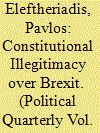

|
|
|
|
|
| Summary/Abstract |
Members and supporters of the British government say that the only constitutionally legitimate course of action over Brexit after the referendum is to press ahead with withdrawal from the European Union, even if that would entail the complete severance of all ties (which we normally call ‘hard Brexit’). A more sophisticated view of the constitution, however, shows that these more or less populist arguments are false. As the Supreme Court confirmed in the recent Gina Miller judgment, the constitution did not change with the June referendum. Parliament is still supreme and determines both ordinary legislation and constitutional change. In fact, if one examines closely the claim that the referendum entails hard Brexit, it becomes obvious that this claim is false as well. The referendum opened the door for one among four different possibilities. Which Brexit option—if any—the United Kingdom should take is a matter for Parliament now to decide, following the normal processes of democratic deliberation and representation.
|
|
|
|
|
|
|
|
|
|
|
|
|
|
|
|
| 2 |
ID:
153295
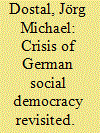

|
|
|
|
|
| Summary/Abstract |
This article analyses the dramatic electoral decline of German social democracy since 2003. It argues that the SPD's decision, under the leadership of former Chancellor Gerhard Schröder, to engage in welfare state retrenchment and labour market deregulation during the ‘Hartz reforms’ (2003–05) demoralised the SPD electorate. The SPD subsequently lost half of its former electoral coalition, namely blue-collar voters and socially disadvantaged groups, while efforts to gain access to centrist and middle-class voters have failed to produce any compensating gains. While the SPD's decline from a large to a mid-sized party is part of a larger transformation of the German party system, no political recovery is possible for social democracy without a fundamental change of strategy, namely efforts to regain former voters by offering credible social welfare and redistributive policies. The SPD will not be able to delegate such policies in a ‘convoy model’ to other parties, such as the Left Party; nor will a modest ‘correction’ of the earlier course, such as has been attempted since 2009 under the leadership of current party chairman Sigmar Gabriel, be sufficient to recover lost electoral ground.
|
|
|
|
|
|
|
|
|
|
|
|
|
|
|
|
| 3 |
ID:
153290
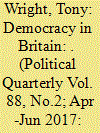

|
|
|
|
|
| Summary/Abstract |
The EU referendum has raised questions about the nature of democracy, which is not just majority rule. It is wrong to claim that direct democracy has now replaced representative democracy, as Parliament is required to answer all the questions that the referendum did not. The conduct of the referendum reflected the worst aspects of Britain's political culture of sterile adversarialism. Both left and right have shared assumptions about governing that have made it difficult to develop a culture of democratic citizenship. The political system still reflects its pre-democratic origins (as in the survival of a House of Lords and the obsession with titles) and the role of money in politics represents a form of corruption. Institutional reforms depend for their success on the nurturing of a democratic culture, which is a task for many hands.
|
|
|
|
|
|
|
|
|
|
|
|
|
|
|
|
| 4 |
ID:
153288
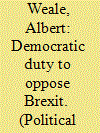

|
|
|
|
|
| Summary/Abstract |
What should be the position of democrats in response to the Brexit referendum? Many urge a duty to accept the result. This article argues the contrary. If someone is a UK citizen, has a belief that leaving the European Union will be damaging to the common good of the UK and is a convinced democrat, then that person has a duty to oppose Brexit. Neither of the two principal reasons for accepting the result—a claim of popular sovereignty or of parliamentary sovereignty—imply a duty not to continue to oppose. Arguments from political equality for simple majority rule do not apply when the alternatives are ill defined. More generally, popular sovereignty presupposes and does not replace constitutional democracy, and in a parliamentary democracy there is always a continuing right to oppose.
|
|
|
|
|
|
|
|
|
|
|
|
|
|
|
|
| 5 |
ID:
153299


|
|
|
|
|
| Summary/Abstract |
Facchini uses a behavioural approach to analyse the political beliefs of French people, who he believes are ‘more or less incompetent’ in economics. In this article I focus on his premise that the public are incompetent and that therefore their views, such as being opposed to the market in the case of the French people, should be interpreted as ‘perception bias’. Other economists may echo Facchini, claiming that people who voted Leave in the UK and for Trump in the USA did so because their lack of economic knowledge contributed to an ‘anti-foreign bias’. However, I argue here that the existing empirical research showing that people lack economic knowledge is flawed. Many economists adopt a questionable approach to the interpretation of public knowledge and the evaluation of what knowledge is important.
|
|
|
|
|
|
|
|
|
|
|
|
|
|
|
|
| 6 |
ID:
153300
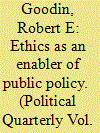

|
|
|
|
|
| Summary/Abstract |
Ethics constrains us. But ethics can also act as an ‘enabler’, helping to secure compliance with public policies. Basing policies on ethical principles helps the public know what is required of them by public policies. Framing policies in those ways also primes people to think in terms of their own ethically based reasons for action. Basing policies on ethical principles can assist in securing the cooperation of potential veto players by creating cooperative norms and a culture of trust.
|
|
|
|
|
|
|
|
|
|
|
|
|
|
|
|
| 7 |
ID:
153304


|
|
|
| 8 |
ID:
153297
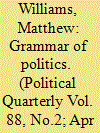

|
|
|
|
|
| Summary/Abstract |
Legislative language is a crucial, yet somewhat overlooked element of British politics. So how has the language of British legislation changed over the past century? For this study, all 191,080 pages of legislation enacted between 1900 and 2015 were assessed for changes in the quantity of legislation, and 5,878 sections of legislation from 1920 to 2015 were analysed for changes to the quality of language. Parts of speech that affect the subject, object and verb of sentences were recorded, giving a novel long-term study of indeterminacy in legislative language. Findings show that interpreting legislation became increasingly dependent on circumstance and discretion after the war. Change further accelerated after 1975. This reflected a widening gap between public demands placed on government power and the difficulties faced in accommodating these demands.
|
|
|
|
|
|
|
|
|
|
|
|
|
|
|
|
| 9 |
ID:
153301
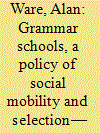

|
|
|
|
|
| Summary/Abstract |
Initially, four plausible reasons for introducing selection in secondary education are examined, three of which are irrelevant to contemporary debates about expanding grammar-school education. These are: first, to ration education in less advanced economies; second, to increase the supply of skilled labour within an expanded national elite; third, as part of a ‘segmented’ system of education. A fourth—increasing upward social mobility—is open to two objections: first, the May government's proposals are so limited as to have little likely impact on mobility and, second, upward mobility in the twentieth century was possible only because of structural change in the British labour market, and that will probably not continue in this century. Finally, it is argued that attempts to select the ‘best’ in any activity or skill are necessarily highly imperfect, and are far less accurate than testing who does and does not meet some minimum level of competence.
|
|
|
|
|
|
|
|
|
|
|
|
|
|
|
|
| 10 |
ID:
153305


|
|
|
| 11 |
ID:
153296


|
|
|
|
|
| Summary/Abstract |
The 2016 Northern Ireland Assembly election highlighted substantive issues within nationalism. Both the main nationalist parties, the Social Democratic and Labour Party (SDLP) and Sinn Féin, recorded the worst combined vote for over 20 years. This article suggests that the downturn in nationalist support was years in the making and examines why nationalist voters might be turning away from the ballot box. It considers the various factors that underlined both parties' approach to consecutive electoral tests from 1998 until 2016, showing how Sinn Féin replaced the SDLP as the leading force within nationalism, and concluding that new leadership may yet halt the process of orderly decline.
|
|
|
|
|
|
|
|
|
|
|
|
|
|
|
|
| 12 |
ID:
153294


|
|
|
|
|
| Summary/Abstract |
The three great Western political traditions (conservatism, liberalism, social democracy) incorporate three of the four possible combinations of the core political axes: traditional, unchanging authority versus the challenge of change, and egalitarianism versus inegalitarianism. The fourth possibility—egalitarian conservatism—has appeared in various guises, but has usually become submerged within the right, including its most authoritarian forms. Current xenophobic movements claiming to represent those suffering from excessive change—for example, those involved in the UK's EU referendum and Donald Trump's victory in the USA—are seeing an apparent resurgence of this neglected tradition. What are its implications for politics in general?
|
|
|
|
|
|
|
|
|
|
|
|
|
|
|
|
| 13 |
ID:
153306


|
|
|
| 14 |
ID:
153287


|
|
|
| 15 |
ID:
153291


|
|
|
|
|
| Summary/Abstract |
The Electoral Reform Society has called for more and better quality information to improve democratic debate in relation to referendums. This article argues that, particularly in relation to the European Union referendum, this would have had a marginal impact, because much of the debate was not reducible to facts and emotional and dispositional factors were of particular significance in the campaign.
|
|
|
|
|
|
|
|
|
|
|
|
|
|
|
|
| 16 |
ID:
153292


|
|
|
|
|
| Summary/Abstract |
Populism has often been described as a great challenge and threat to Western democracies. Not surprisingly, at a time in which we are witnessing a significant rise in populist actors in Europe and the US, scientific analyses and commentary regarding populism have become particularly popular and, indeed, necessary. My aim in this article is to offer a brief yet comprehensive overview of the ongoing debates in a bid to problematise the supposed ‘imminent threat’ of populism in light of recent developments within the political systems and societies of established democracies, especially under conditions of crisis. I understand populism as a specific type of discourse, and thus as a way—among others—of doing politics and appealing to groups of people. Thus, I highlight the varying orientations that populist movements might take, depending on the ideological traditions with which they are closely articulated and the sociopolitical environment in which they manifest. Last, I relate the ‘populist surge’ to discussions regarding post-democracy.
|
|
|
|
|
|
|
|
|
|
|
|
|
|
|
|
| 17 |
ID:
153298


|
|
|
|
|
| Summary/Abstract |
This article explains failures of politics and government through the incompetence of voters and their perception biases. It illustrates this argument using the French case. If voters lack knowledge and develop irrational beliefs, then voting is probably not effective as a mechanism for sanctioning public policy. The incompetence of French voters and their anti-capitalist bias is well documented. This incompetence can be partly explained by the low cost of holding irrational beliefs in politics. Voters’ anti-capitalist attitudes are explained by the utility they obtain from expressing themselves in favour of state intervention, and by France's prohibitive level of justification costs of holding pro-capitalist views. The resulting biases contribute to the failure of public choice.
|
|
|
|
|
|
|
|
|
|
|
|
|
|
|
|
| 18 |
ID:
153302


|
|
|
|
|
| Summary/Abstract |
SINCE 1986 the number of UK households renting privately has increased from 1.85 million to 5.3 million. This private landlord renaissance has been supported by buy to let investment, tax concessions, subsidies, light touch regulation, the right to buy scheme and housing benefit. However, private landlordism makes only a small contribution to new housing supply, characterised by low quality, adds to state expenditure, increases social inequality and has a negative impact on family life. Following the stark revelation of ‘two Englands’ in the Brexit vote, ways to curb the sector's growth need to have a higher place on the political agenda.
|
|
|
|
|
|
|
|
|
|
|
|
|
|
|
|
| 19 |
ID:
153303


|
|
|
|
|
| Summary/Abstract |
Basic income advocates propose a model that they believe will dramatically improve on current welfare programmes by alleviating poverty, reducing involuntary unemployment and social exclusion, redistributing care work, achieving a better work–life balance, and so on. Whether these expected social effects materialise in practice critically depends on how the model is implemented, but on this topic the basic income debate remains largely silent. Few advocates explicitly consider questions of implementation, and those that do are typically dismissive of the administrative challenges of implementing a basic income and critical (even overtly hostile) towards bureaucracy. In this contribution we briefly examine (and rebut) several reasons that have led basic income advocates to ignore administration. The main peril of such neglect, we argue, is that it misleads basic income advocates into a form of Panglossian optimism that risks causing basic income advocacy to become self-defeating.
|
|
|
|
|
|
|
|
|
|
|
|
|
|
|
|
| 20 |
ID:
153293


|
|
|
|
|
| Summary/Abstract |
Members of the British Labour party have, not for the first time, criticised the Boundary Commissions’ proposals for new constituency boundaries as gerrymandering. This represents a misuse of the term: the Commissions have produced recommended constituencies in the context of new rules for such redistributions that give precedence to equality of electorates across all seats and the boundaries of those constituencies have been defined without any reference to the likely electoral consequences. The Conservatives, who were responsible for the change in the rules to emphasise electoral equality, wanted to remove a decades-long Labour advantage in the translation of votes into seats because of variations in constituency size, and the Commissions’ implementation of those rules has achieved that. A Labour advantage has been removed but not replaced by a Conservative advantage: in terms of electoral equality between the two, the playing field has been levelled. Labour's claim to have been disadvantaged by decisions on the electoral register is also examined; the disadvantage is probably only small.
|
|
|
|
|
|
|
|
|
|
|
|
|
|
|
|
|
|
|
|
|